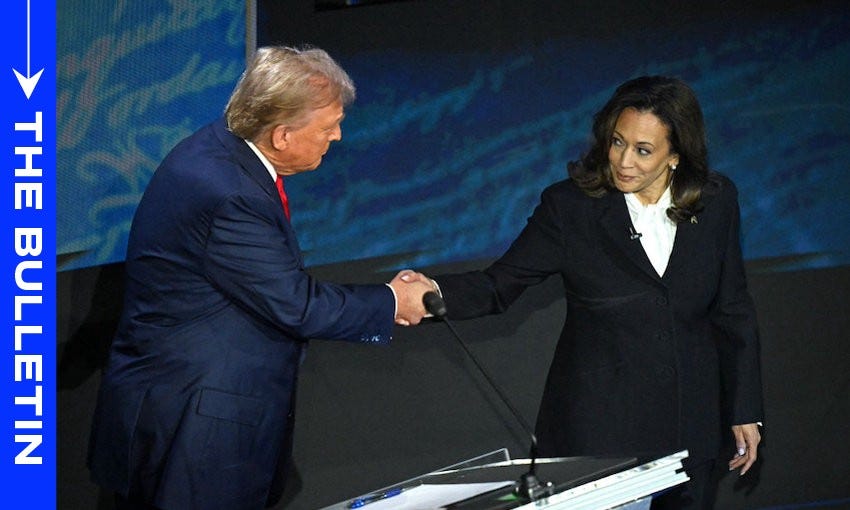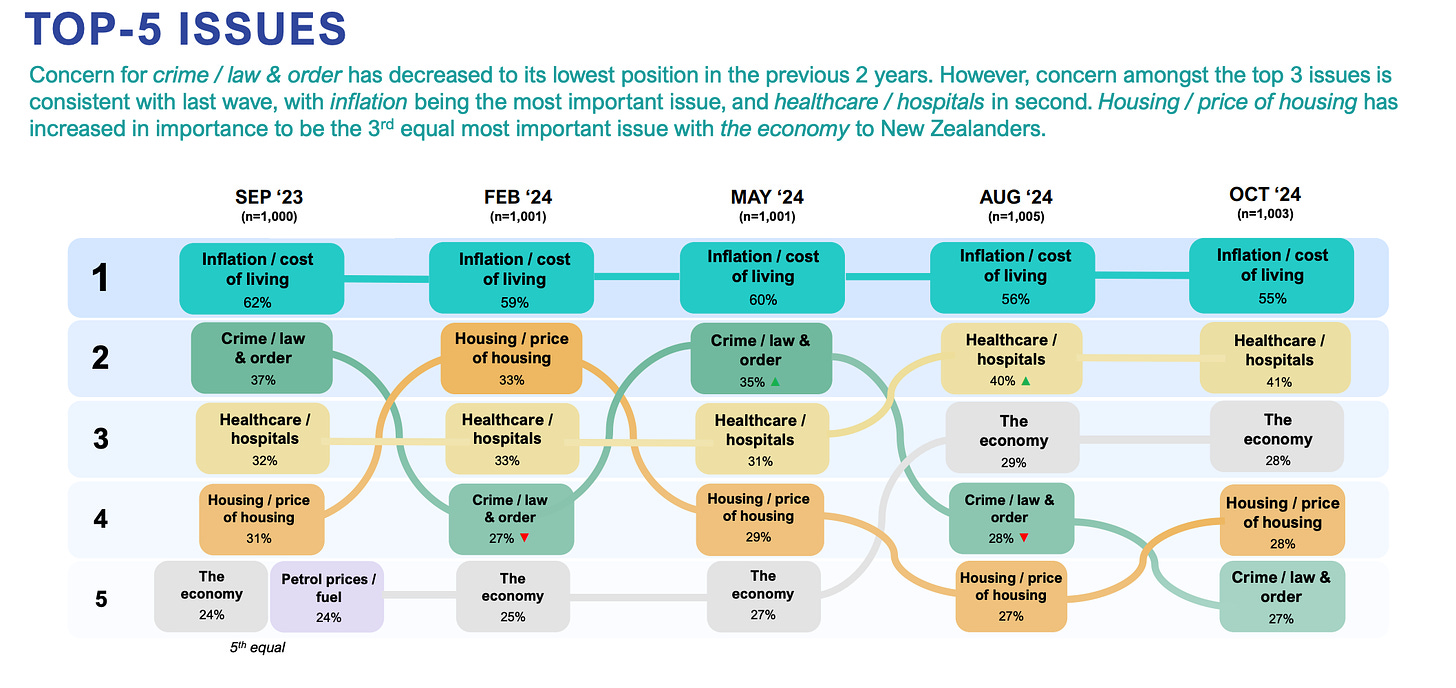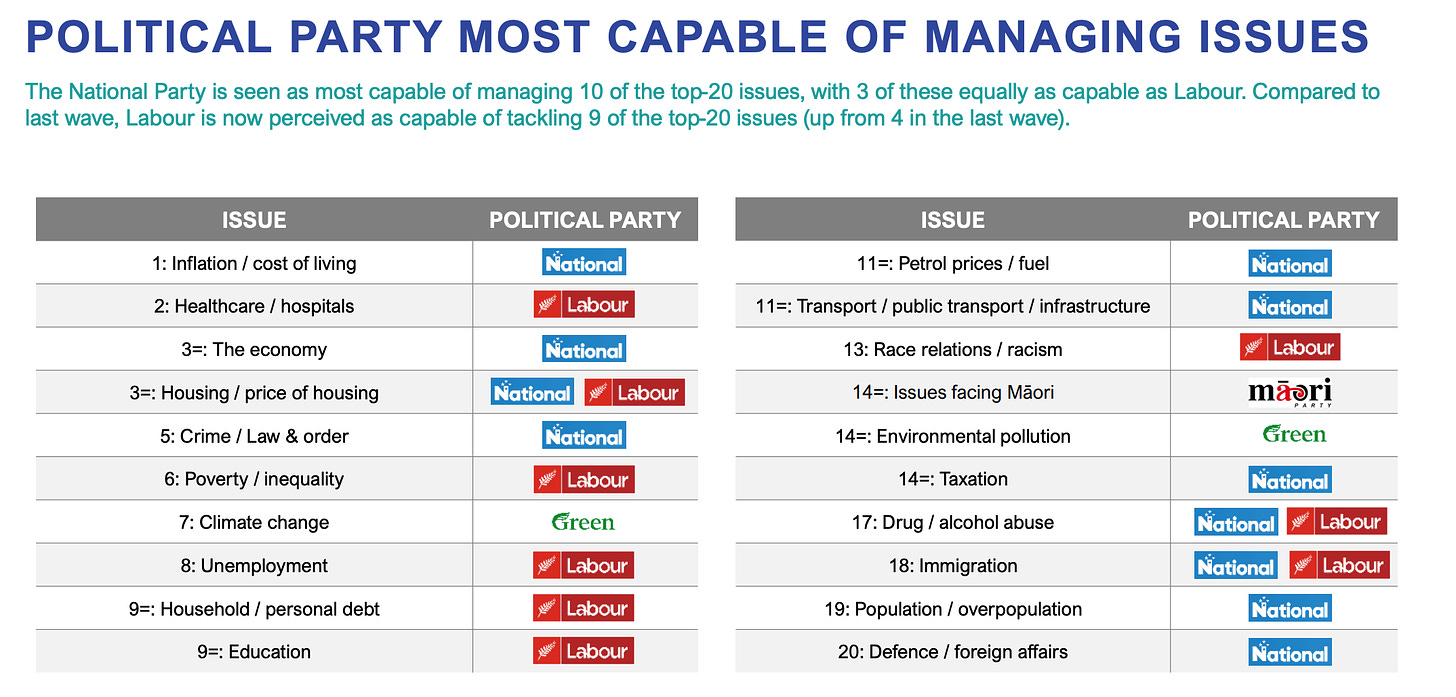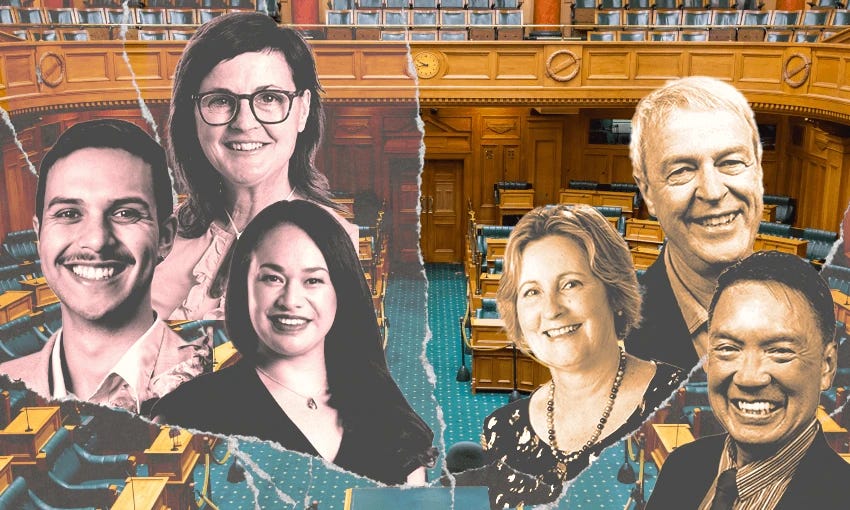The presidential race enters the home stretch
Trump spent time in his old stomping ground, while Harris picked up yet another major celebrity endorsement.
Mōrena, and welcome to The Bulletin for Tuesday, October 29.
In today’s edition: Labour is closing the gap on key issues, according to a new poll; more changes to the building consent process are on the way; and Kāinga Ora spent $300m on 371 public housing projects at risk of being cancelled. But first, the dying days of the US election campaign have seen Donald Trump appear before thousands in New York and Kamala Harris secure possibly her biggest endorsement yet.

A Trump homecoming in true blue New York
Welcome back, I hope you enjoyed the long weekend. Thanks to Anna for covering in my absence.
Given it’s a short week and not a lot tends to happen over a long weekend, I thought we’d start things off by looking at the impending US election. In just over a week, polls will close in the presidential race between Donald Trump and Kamala Harris, setting the course for the next four years of global politics. Yesterday saw Trump appear before thousands at New York’s Madison Square Garden, for what was something of a homecoming rally. As The Guardian reported, the former president’s speech (which has been somewhat overshadowed by a comedian’s offensive jokes) included the expected off-beat tangents and focused largely on immigration along with attacks on not only his opponent, but what he has called the “enemy within” – those he views as having wronged or betrayed him in the past. Trump has virtually no chance of winning New York (polls have him about 15 points behind Harris), but has made several detours away from swing states over his campaign. One Trump backer put that down to the spectacle of an appearance at the iconic New York arena. “It just goes to show ya that he has a bigger following of any man that has ever lived,” they said. Critics have called it a vanity rally.
Writing for The Post, Andrea Vance, who is in New York, noted that Trump’s team are relying on the rally to reach audiences far outside of New York. But, Vance added, there is also an unpleasant parallel for the former president. Trump has been fighting off claims from his former chief of staff that he fits the definition of a fascist and, in 1939, thousands of pro-Nazi sympathisers packed in the Garden for rallies in the lead up to World War II. As CNN reported, Democrats projected messages on the exterior of Madison Square Garden during the rally that “Trump is Unhinged” and “Trump praised Hitler”.
Celebrity power
Meanwhile, vice president Kamala Harris has been in the critical swing state of Pennsylvania. It’s the largest of the battlegrounds and, as NPR explains, could dictate who nudges ahead on election night. It’s an intriguingly divided electorate, part of the reason both candidates have spent substantial time on the ground there. As The Guardian reported, Harris’s speech over the weekend continued to frame the election as a choice between two “extremely different visions” for the country, while taking aim at the “fear and divisiveness” that she said had been caused by Trump.
Earlier in the weekend, Harris was joined by pop superstar Beyonce at a rally in Texas. The singer said she was at the rally not as a celebrity or politician, reported AP, but as a “mother who cares deeply about the world my children and all of our children live in, a world where we have the freedom to control our bodies, a world where we’re not divided”. Beyonce is the latest in a long list of high profile endorsements for Harris, including from Taylor Swift and Oprah. In a piece for Vox, it was noted that while celebrity endorsements may not do a lot to sway an election, Beyonce’s star power brings with it wide reach and influence. At the very least, it could convince a large number of people to register to vote – especially among demographics core to the Harris campaign.
The podcast election
While the two presidential contenders are continuing to host large rallies, one traditional medium of campaigning has been largely abandoned – that being the mainstream media. Trump shunned the traditional pre-election interview with 60 minutes, for example, but over the weekend appeared for a three-hour sit down with prominent podcaster Joe Rogan (an interview that was, claimed CNN, littered with at least 32 unfounded and unchecked claims). The fact he made inaccurate comments isn’t new, nor is the fact that weren’t picked up in real time. But the decision to speak with alternative media outlets is relatively novel, leading some to claim this as the podcast election.
This comment by Brady Brickner-Wood in the New Yorker earlier this month nicely sums up, I think, the appeal for candidates in choosing to speak with alternative media. “When a public figure sits across from a podcast host to embark on a purportedly shapeless, stream-of-consciousness chat suffused with crude jokes and senseless tangents, an odd alchemy occurs: the speakers begin to sound like pals bantering at a pre-game, with the listener as a silent confidant.”
Harris, too, has opted to give interviews with outlets outside of the mainstream press, such as on Alex Cooper’s Call Her Daddy – a show with a predominantly female audience. As the AP explained, few outlets offer the opportunity to zero in on an audience better than podcasts.
The New Zealand angle
It’s easy to think that the US election doesn’t matter for us down in little old New Zealand. But former National Party leader, and US politics obsessive, Todd Muller told The Spinoff’s Toby Manhire on a special edition of Gone by Lunchtime, that’s the wrong way to think about it. “What you want from a New Zealand perspective is consistent, predictable leadership from America,” he said. “My personal view is that Trump, from a foreign policy perspective, is just too unpredictable. You just do not know what he’s going to say or do on any given day.”
On Trump as a candidate, Muller said that while most New Zealanders find his personal approach to politics “aggressive”, many of his American supporters like what he represents – the anti-establishment.
Muller’s old boss, John Key, agreed. In a recent interview with ThreeNews’s Samantha Hayes (that also saw the ex-PM show off his new helicopter), Key said Trump’s popularity was symptomatic of “middle America… feeling left behind and feeling unfairly treated”. But while Key believed that Trump’s “America First” views wouldn’t benefit New Zealand all that much, he still thought that “on balance” he would be better for the economy. “He's likely to embrace a bit more market. He's likely to have less red tape and he's certainly going to have lower taxes. So that bit is good.”
Join our community of supporters
"I like that it feels like chipping in for a good cause, rather than paying for a subscription." – Kimberley, Spinoff member.
Whether you read, listen to or watch our mahi, you can support us to do more by donating today or signing up to become a member. Already a member? Ka nui te mihi, your support means the world to us.
Labour closing the gap on key issues
The National Party is still seen as the party best capable of tackling the issues that matter most to New Zealanders, but Labour is closing the gap. The latest Ipsos New Zealand Issues Monitor was released this morning, reported the Herald’s Thomas Coughlan, showing that inflation and the cost of living remain top of mind for most. Healthcare, the economy, housing and crime round out the top five issues, as shown on the chart below.
Of the top 20 issues, National is seen as most capable of managing 10 of them, with three equally as capable as Labour. Labour is now seen as capable of tackling nine, up from four in the last survey. Of particular note is the widening gap between Labour and National on the issue of health and hospitals, likely bolstered by the government’s decision not to push ahead with the full Dunedin Hospital rebuild. Compared to the total population, those living in Otago were 59% more likely to mention healthcare or hospitals as an issue.
More changes to building consent process on the way
The government will unveil the next stage of its building reforms today, reported Luke Malpass for The Post, in an effort to speed up construction and reduce costs for consumers. The new changes will mean that reputable builders along with plumbers and drain-layers can self-certify their work, cutting out the middleman and bringing costs down. As Malpass explained, it could potentially mean that “new, simple, repeatable houses built by big reputable builders… could be built without any building consents at all.”
Building minister Chris Penk said that the current consenting system is one size fits all. “There are really good trade professionals who aren't trusted to get on and do the work and certify their own work,” he said. It won’t mean that consumers lose their protections, argued Penk, as the people doing the work tend to carry significant insurance through licensing bodies. “It's more meaningful to have the assurance of someone being responsible by signing off their own work themselves, plus having a professional body with some sort of monetary backing of them, rather than just that sort of general recourse of having to sue them,” said Penk.
Join us for a one-night only live event
We’re huge fans of local television here at The Spinoff, and for one night only we want to celebrate some of our all-time faves. Join Alex Casey, Kura Forrester, Rhiannon McCall, Stewart Sowman-Lund and Lyric Waiwiri-Smith at Q Theatre this Thursday night as we unearth some beloved TV gems and argue for their place in our history.
Click and Collect
Kāinga Ora spent $300m on 371 public housing projects at risk of being cancelled. (NZ Herald Premium, paywalled)
Act MP sets sight on scrapping West Auckland alcohol licensing trust monopolies.
Treasury has advised the government could boost Kiwibank's capital either by issuing debt securities, sourcing new capital from third parties, or via a share market initial public offering.
The war of words between Winston Peters and Labour halted over the weekend, but will likely heat up again this week. Jenna Lynch explains why Ministry of Health has questions to answer.
Labour MP Ginny Andersen has apologised after resharing a meme poking fun at King Charles and Christopher Luxon on Instagram.
Wellington City Council isn’t dysfunctional, writes Joel MacManus for Windbag, they’re just politicians. Now 48, Megan Dunn is still paying off the huge student loan she first took out when she was 17. It’s her number one regret. What to watch on Netflix NZ, Neon and more this week. Liam Rātana looks at the first official flag of Aotearoa and what it represents. If you missed it last week, here is the complete top 100 NZ TV shows of the 21st Century. For My Life in TV, Brodie Kane reveals the beloved rom-com she couldn’t stand. And alt-pop singer Theia shares her perfect weekend playlist.
That’s it for today, thanks for reading. See you back here tomorrow morning.
Want to get in touch? Join the conversation in the Substack comments section below or via email at thebulletin@thespinoff.co.nz if you have any feedback on today’s top stories (or anything else in the news).
If you liked what you read today, share The Bulletin with friends, family and colleagues.
















I feel so sorry for her having to be polite to that * and having to touch him.
It was a hate rally, not a homecoming rally.